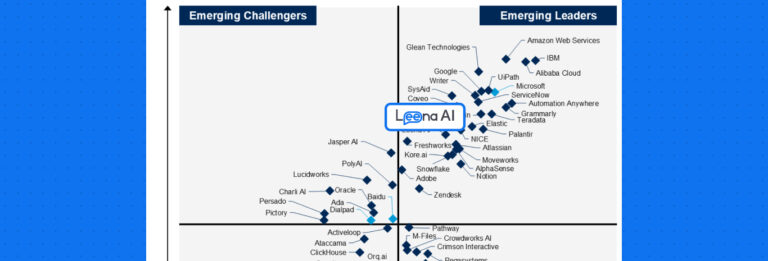Paperless documentation is the new norm that aims at bringing greater returns across the various functions of an organization. Studies indicate that businesses that went paperless achieved their total ROI in less than 12 months and payback in less than 18 months. It specifically holds true for the human resources department of an organization.
An HR document management system, also known as HR DMS, uses computer software to store, manage, and track electronic documents and images related to employee information, organizational policies, payout data/ salary breakdowns, process descriptions, job roles, etc.
While DMS is a critical part of any growing company, traditional document management systems and processes are no longer feasible in the newly emerged work environment. This is why HR departments across companies often find themselves drowning in the complexities of managing gigantic data. Fortunately, organizations are realizing this and turning towards integrating AI with document management to streamline document management.
AI in document management also plays a pivotal role in saving HRs time and resources that they can, otherwise, invest in more crucial aspects of business, instead of repetitive manual documentation.
This blog explores the top 9 ways AI transforms the document management process for HRs and employees.
Role of AI in document management

Integrating the latest technology, like artificial intelligence and machine learning, has become vital for organizations to function effectively in the modern workplace. Learn how inculcating AI in document management systems benefits your organization profoundly:
1. Automated processing
Mass data generation has become a common practice, irrespective of the size of your organization. But processing all the employee documents manually is time-consuming, exhausting, and prone to human error.
To keep up with the fast-paced industry trends, going digital and employing automation is imperative. The modern documentation process is efficient and saves the company’s space and resources.
According to a report, every 4-drawer file cabinet, on average, holds between 10,000-12,000 documents, taking up about 9 square feet of floor space, and costing approximately $1,500 yearly to maintain.
Integrating AI into document management eases identifying, classifying, categorizing, and separating different documents, be it payroll, appraisal, benefits-related, or any important employee documentation.
For example, when HRs and managers try to identify high-performing employees, AI-powered DMS can help them process employees’ performance reports, their skills, overall growth in the organization, and the value they have brought during their lifecycle. It helps HRs plan out recognition and rewards accordingly.
2. Data extraction
Another hassle in manually processing unstructured data is combing piles of documents to pull out the relevant information and organize them. As per the Gartner report, 80% of organizations still have unstructured data. Needless to mention that traditional data extraction techniques often hamper the productivity of employees and the HR department.
AI in document management takes the process of data extraction up several notches. It analyzes the text within the documents and captures the relationships across various fields and text, generating structured data.
An AI-powered document management system also processes the information precisely and accurately to understand the context. It ensures that employees are able to instantly retrieve any particular data from a vast content library — whenever, wherever.
HR professionals, on the other hand, can gain insights from the data, such as the demographics of the employees to assess diversity in the workplace. Quick access to information helps them collect and store employee documents efficiently on a compliant, secure, and centralized platform.
3. Easy updates
Another perk of infusing AI into document management is to let employees update their information/details independently. In the traditional DMS, employees needed to visit the HR department for every little change in their details.
With an AI-driven DMS solution, employees can access the centralized platform with valid credentials and update their information when required. The automated DMS solution lets employees focus on their core responsibilities instead of running around the HR department for their query resolution.
Leena AI’s document management system is an AI-powered tool that lets HRs define access and edit permissions for employees based on the document type and employee attributes. To know more about how it works, schedule a demo.
4. Holistic security
A DMS is a central repository for all sensitive data in an organization. However, with technological advancement, cyber-attacks and data breaches have increased significantly.
AI in document management safeguards all the data and documents of an organization. It equips your DMS to discover any personally identifiable information (or PII) and handle it carefully. From sensitive documents to highly encrypted data sheets, AI-powered DMS route and streamline them to a centralized platform without compromising security.
Artificial intelligence in document management not only works on finding specific attack patterns but also monitors your DMS for subtle but unusual activities that may indicate a breach.
AI-based document management systems like Leena AI come with advanced security features like file control enforcements, alerts for process adherence, custom document privileges for employees based on their attributes, and more.
5. Document clustering
Document clustering is the practice of grouping an extensive collection of documents into smaller clusters representing a specific topic. It helps in quickly identifying the links between different documents and pinpointing similarities across large data sets.
The concept of document clustering is not new. Many search engines have adapted it. Accuracy and precision in this task are critical for businesses with voluminous documentation, like in the legal and financial sectors.
Scaling businesses need to take care of multiple interlinked operations, and an AI-powered DMS only makes it more accessible. AI in document management can handle everything from segmenting your employee database based on skills, experience, and performance parameters to creating custom employee lifecycle journeys for better engagement and retention.
An AI-powered virtual assistant sorts through data and assigns vast libraries of documents to different groups, despite not having any previous classification. Such a feature is useful for visualizing how the data is related and discovering the similarities between documents, making it understandable for the concerned departments.
Document clustering also makes it easier to categorize, organize, and search what you need across all employee files.
6. System compliance
The absence of an efficient document management system can adversely affect your company’s compliance standards with some of the existing rules. That’s why organizations should figure out a consistent approach to systematically process documentation and abide by all the compliance requirements.
An AI-automated tool saves businesses from the hassle of worrying and managing compliance. It effectively reduces the risk of failure or violation of any compliance rule – especially related to documents around organization policies, structure, and employee information.
AI-driven DMS is armed for managing and protecting confidential data. It acts like an intelligent layer of protection and makes it much easier for your company to abide by rigid and industry-specific data regulations.
7. Data Analytics
Extracted data does not hold any value until it’s processed to derive value from it. That is where AI in document management can help. It not only tracks and extracts all relevant data from clusters of documents but also derives actionable insights by quickly processing the data using features such as predictive analytics and data visualization.
The AI-powered DMS analyzes data from hundreds of sources and forecasts what is effective and what is not. It can also dig deeper into the collected data on your organizational efforts. For example, it can deep dive into HR processes like onboarding, team building activities, and employee engagement data, and highlight actionable insights. It can help HR professionals quickly identify and adapt their efforts to the changing expectations of the employees.
8. Improved decision-making
The talent war in the corporate landscape has become cutthroat. So it is no wonder businesses across industries are inclined to propel their decision-making process on tangible and quantifiable information.
The most significant advantage of integrating AI in document management is the ease and efficiency of decision-making. AI analyzes the data to help HRs understand employee issues and improve the decision-making capabilities of business leaders.
That is precisely why data-driven business decisions are the norm now. Companies these days prefer solutions based on big data, machine learning, and artificial intelligence since a data-based approach helps study vast amounts of data from department performance, new hire efficiency, employee lifecycle and growth, the impact of new skills, and much more.
It provides comprehensive insights, thereby allowing the company to save costs, plan growth strategies, streamline various processes, and improve decision-making capabilities.
9. New employee insights
For a higher return on your talent acquisition and hiring efforts, you need to evaluate the impact that employees have on your organization. Moreover, you need to uncover untapped data in your processes to identify business opportunities and areas of improvement.
For example, Leena AI’s AI-powered DMS captures employees’ feedback/reaction post completing an action or consuming the information for addressing their queries. It uncovers the little nuances that can help HR departments create personalized journeys for the talent hired.
Bottom Line

Documentation is no longer just a tool for verification. The data collected through the process is imperative for better business insights and evolving HR processes.
With many compliances to follow, making the HR department responsible for handling heaps of documents, is no longer a viable option. An advanced AI-powered document management system is crucial for growing organizations and enterprises.
With Leena AI’s cutting-edge document management system, HRs and employees can easily access and update all their documents. HRs can collect and store employee documents effortlessly on a centralized platform.
They can then use the unified dashboard of Leena AI to do away with unorganized and unstructured data. The DMS integrates with all the existing tools to automatically store the documents in a centralized location and help employees retrieve any documents within seconds using the virtual assistant.
Want to see how our DMS works?
Book a demo nowFAQs:
How is AI used in document management?
AI in document management helps HRs access and update all the employee documents on a centralized platform. It helps HRs collect and store employee documents effortlessly on a platform that is compliant and secure.
What is intelligent document management?
Intelligent document management leverages artificial intelligence and machine learning to automate the document management process. It helps enterprises get rid of unorganized dashboards, retrieve any document within seconds, and ensure compliance with file control enforcement.
What is an automated document management system?
An automated document management system automates the process of manually collecting, storing, retrieving, and updating documents from different sources. The document management system leverages an AI-powered virtual assistant to manage documents on a centralized platform without missing compliance requirements.






